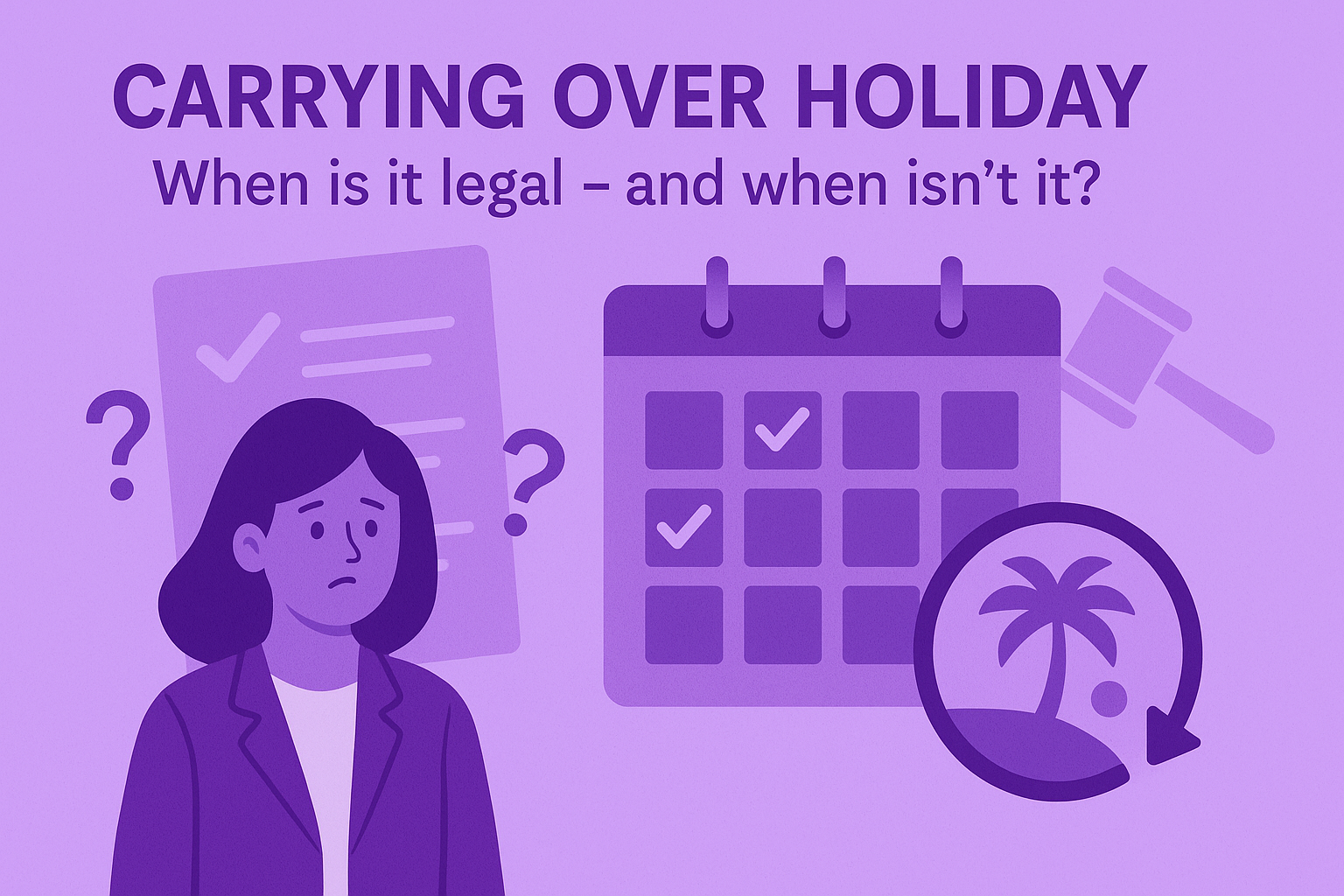Holiday entitlement should be one of the simplest parts of employment. And yet, year after year, it becomes one of the biggest HR headaches for small businesses. When to allow employees to carry over holiday can cause confusion and inconsistency across workplaces.
“Can I carry this over?”
“I didn’t take it all – can I save it?”
“They said I could use it next year…”
Sound familiar?
The truth is: carrying over holiday is only legal in very specific circumstances – and getting it wrong can leave your business exposed to legal risk, employee disputes and even tribunal claims.
Let’s break it down in plain English.
The Basics: What Does the Law Say?
Under the Working Time Regulations 1998, UK workers are entitled to 5.6 weeks’ paid holiday per year:
This equates to:
- 28 days for full-time employees working 5 days per week
- Pro-rated for part-time staff
This is known as statutory minimum leave – and the key point is:
Statutory holiday is intended for rest and recovery – not for stockpiling.
As a general rule, statutory holiday must be taken in the leave year it relates to and cannot simply be rolled over because it suits the individual.
When Is Carrying Over Holiday Legal?
There ARE situations where carry-over is lawful. These typically include:
1. Long-term sickness or family-related leave
If an employee is unable to take their holiday because they are:
- On long-term sickness absence
- On maternity, adoption or shared parental leave
They are legally allowed to carry over up to 4 weeks of statutory leave into the next leave year.
(Read more on the legal rules for holiday carry-over at ACAS “Carrying over holiday”)
2. They were prevented from taking leave
If you, as the employer, failed to give them opportunity to take leave (for example due to workload or poor planning), they may be entitled to carry it forward.
This is why it’s crucial to actively encourage employees to take their leave – not just leave it to chance.
3. Your contracts or policy allow enhanced leave to roll over
Anything above 28 days (enhanced contractual leave) can be treated more flexibly – but only if your policy clearly allows this.
This should be documented within your:
- Holiday policy
- Employment contracts
- Employee handbook
When Is It NOT Legal?
Carrying over holiday is NOT lawful when:
❌ Employees simply choose not to take it
❌ It’s done out of convenience
❌ It’s used as an informal “perk”
❌ The employee has had every opportunity to use it
Allowing this as standard practice can create an implied contractual right, meaning once you allow it, it becomes very hard to stop later.
And that’s where problems begin.
The Risks to Your Business
Allowing holiday to routinely carry over can result in:
- Claims for unlawful deduction of wages
- Breach of Working Time Regulations
- Burnout and wellbeing concerns
- Poor productivity
- Employees hoarding leave and creating operational disruption
- Tribunal risks where leave wasn’t correctly managed
In short: it’s not just an admin issue – it’s a legal and wellbeing issue.
“But They Haven’t Had Time to Use It…”
This is one of the most common challenges employers face.
If employees haven’t taken holiday due to:
- Poor planning
- Busy periods
- Cultural pressure not to take time off
The responsibility still sits with the employer. You must show that you:
✔ Encouraged leave
✔ Gave opportunity
✔ Monitored balances
✔ Warned of risk of losing it
This is where a good HR system (like BreatheHR 😉) and clear communication are essential.
Best Practice for Employers
To stay compliant and protect your business, you should:
✅ Have a clear holiday policy
✅ Specify carry-over rules clearly
✅ Set deadlines for booking leave
✅ Regularly monitor leave balances
✅ Encourage time off throughout the year
✅ Stop normalising informal agreements
Consistency is everything.
Can You Allow a Final One-Off Carry Over?
Sometimes, as an exceptional compromise, businesses choose to allow a one-off final carry-over, with clear communication that:
- It is a one-time exception
- It will not be repeated
- Going forward, leave must be taken within the year
This can help reset expectations while remaining fair.
The virtuHR View
Carrying over holiday might feel like being “nice” – but in reality, over-flexibility often causes more harm than good.
Clear processes, fair expectations and proactive planning create healthier teams and safer businesses.
If you’re unsure whether your current approach is compliant – or you’ve accidentally created a carry-over culture – getting advice early can save a lot of stress later.
Need help reviewing your holiday policy or managing leave properly?
virtuHR supports small businesses with:
✔ Compliant holiday policies
✔ HR systems setup
✔ Practical people management advice
✔ Clear, stress-free processes
Say goodbye to HR hassle. Say hello to life.

